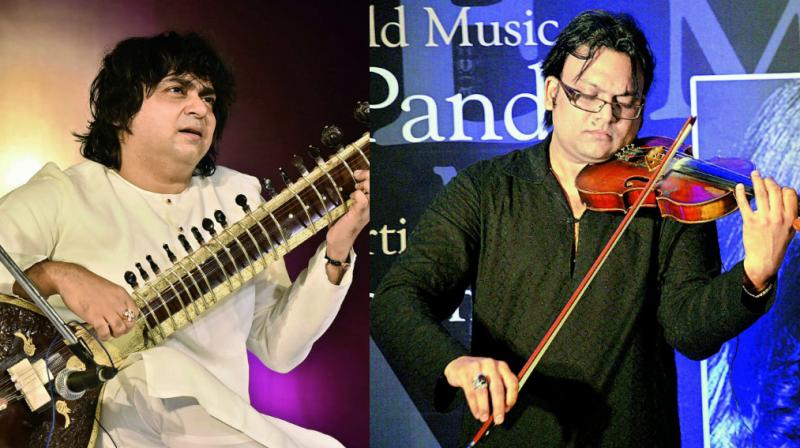Of evolving musical legacies
Musicians Niladri Kumar and Deepak Pandit share stories experiences from their initial days learning Indian classical music.

The young maestros of Indian classical music have been exploring various paths to keep the art form relevant. Among several others, two names that stand out and have made substantial contribution in the field of music are Niladri Kumar and Deepak Pandit, who were recently in town to play at the Pandit Motiram and Pandit Maniram Sangeet Samaroh.
Known for transforming the traditional sitar into zitar, Niladri Kumar has been trending on social media and making headlines for being Amitabh Bachchan’s favourite artiste. He was even asked to perform on Kaun Banega Crorepati on the occasion of Big B’s birthday.
When asked what prompted him to make changes to the sitar, Niladri says, “The sitar has a unique and grand sound. When played with various genres and instruments, it doesn’t gel with them. Hence, I felt the need to alter it. I ruined or rather experimented with my father’s main sitar to come up with the zitar; and while it took me six months to invent the instrument, exploring sound, I would say, is a lifetime process.”
As a college student, Niladri often felt that Indian classical music didn’t have much of an audience. “I slept through music festivals because my turn would always come at the end and I would hardly have any audience. At 19, I started playing for films, which gave me a different kind of exposure. You were supposed to hit the bull’s eye with a hundred people watching you. Later, the shift from analogue to digital and playing with musicians like Sivamani and Louis Banks gave me multilingual and multidimensional exposure. While the classical music has its structure and rules nothing stops a musician from changing its expression to make it more adaptable to audience,” he shares.
On the other hand, Deepak Pandit, ace violinist and the favourite composer of Bollywood singers like Sonu Nigam and Shreya Ghoshal, explored all other genres of music before establishing himself as a classical soloist. Coming from a family of famous qawwals like Shankar Shambhu, Deepak says, “There is an audience for all kinds of music. You just have to understand the pulse and serve it to them. Even though I learnt Indian classical music, I had to explore the field as a composer, an accompanist, an arranger, etc., and this helped me grow as a complete performer.”
In the YouTube era, both the young maestros feel that the media can do wonders in taking the Indian classical art forms to next the level. They are the torch bearers of Indian classical music, and have cut across boundaries, ages and genres to make a mark, believe the duo.

